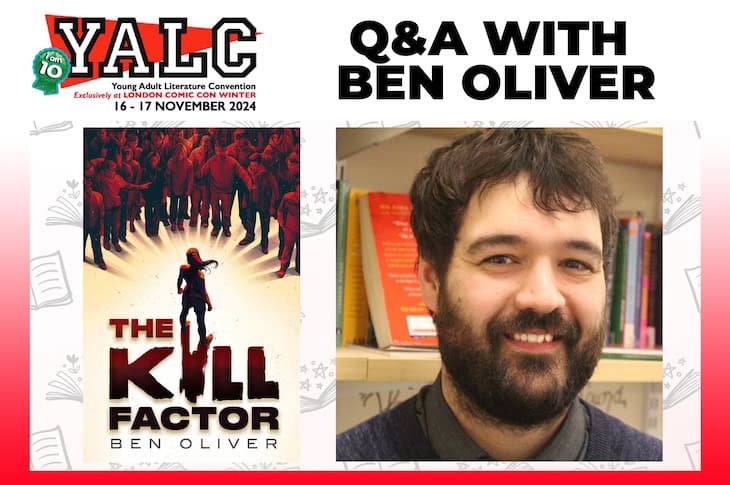We have a wonderful Q&A with the author of ‘The Loop’ and new novel ‘The Kill Factor’ Ben Oliver. Don’t forget to head to YALC Instagram and Twitter for a chance to win a copy of ‘The Kill Factor’.
Can you give our readers a little overview of your new novel ‘The Kill Factor’?
Ideas like this come about by taking a look at where we are as a society in the present, and looking into the future. In this case, I thought about engagement farming, and the monetisation of social media. Where might that lead? We already have some pretty extreme examples of people doing outrageous things in the hope of getting more followers and viewers, so what next? In The Kill Factor, Emerson Ness is offered a reprieve from her prison sentence if she takes part in a manipulative gameshow. She must do whatever she can to gain the more followers than the other contestants in order to win her freedom, but the games they are taking part in become more and more deadly as the show goes on.
The concept of followers equaling money is an interesting one that we are not too far away from in real life. Do you think this idea will become commonplace in the future and is that a good or a bad thing?
I could definitely see it happening! It would horrifying for me – I deleted all my social media, so I’d be destitute on day 1!
‘The Kill Factor’ is based around a gameshow to win freedom from a prison sentence, how did you come up with this idea?
It’s not the first time I’ve written about prisoners being offered either freedom or reduced sentences in exchange for their dignity. It’s not a wholly original idea, there have been examples throughout history of governments offering prisoners freedom if they fight on the frontlines of wars or take part in clinical studies. The idea is so disturning to me that it makes a fascinating starting point for a novel.
Are there any game shows on TV at the moment which you took some inspiration from?
Not really. I don’t think I’ve watched a TV gameshow for a long time, but certainly the original reality shows, like Big Brother, and The Real World were inspirations.
If you could describe the tone of the book in just three words, what would they be?
Dark. Twisty. Action.
Prison and prisoners seem to be a common theme in several of your books, did you do any research relating to this to help your writing process and is there a reason they are featured so heavily?
I honestly don’t know why prisoners feature so heavily in my writing. I’ve never been arrested, so who knows why I feel drawn to the idea. I see a lot of injustice in the justice system, and I’m always reading about it and learning more, so in a way my research is ongoing.
Emerson is a strong female character, was it important for you to have a character of this calibre in a staring role?
I didn’t really think about making Emerson any particular way. She just appeared like that as I was writing. I felt like I wasn’t steering her in any direction. She did what she did when she did it, and it worked out well, luckily.
Do you have any favourite authors, does any of your work take any inspiration from them?
I have a constantly rotating list of favourite authors from Susan Collins to J.D. Sallinger, to Stephen King. I try not to take too much inspiration from anyone in particular. I don’t want to mimic anyone’s style, but there are infinite lessons on writing to be learned from every book.
I have read a few advanced reader reviews, and it seems a lot are asking about a sequel, is this a possibility?
Yes. I haven’t stopped thinking about The Kill Factor world since I finished writing it. I’m currently working on an entirely different novel, but I have some ideas in the back of my mind.
Are you a plotter or a pantser when it comes to writing your novels?
I used to be a pantser, but I’m a mixture of both now. I write very minimal plans to keep me vaguely on course, but I like it when unexpected things happen in the plot while I’m writing.
What advice would you give someone wanting to write their own YA novel?
The only thing that worked for me was to write. I wrote two terrible novels before I wrote one half-decent one. For me, I had to learn from my mistakes, and the only way to do that was by making an almost endless stream of mistakes and learning how to fix them one by one. You can read all the advice you want (and that will help), but in the end you just have to do it.
What do you do when you’re not writing?
I’m a bit fidgety and lost when I’m not writing. I read a lot, I play guitar, I play videogames, I watch movies, but if I don’t have a book idea to work on, I don’t feel right.
Where can our readers find you on social media?
I don’t have any social media anymore. I could never enjoy it, it just made me sad or mad, so I deleted it.
Finally, can you give us your favourite quote from a novel?
Just one? That’s too difficult. I have three quotes tattooed on my left arm, they are “…and you felt like you were disappearing every time you crossed a road.” from The Catcher in the Rye. “So it goes.” from Slaughterhouse Five, and “…crazy enough to keep on trying.” from Kindred.
Thanks again for speaking to us at YALC!

